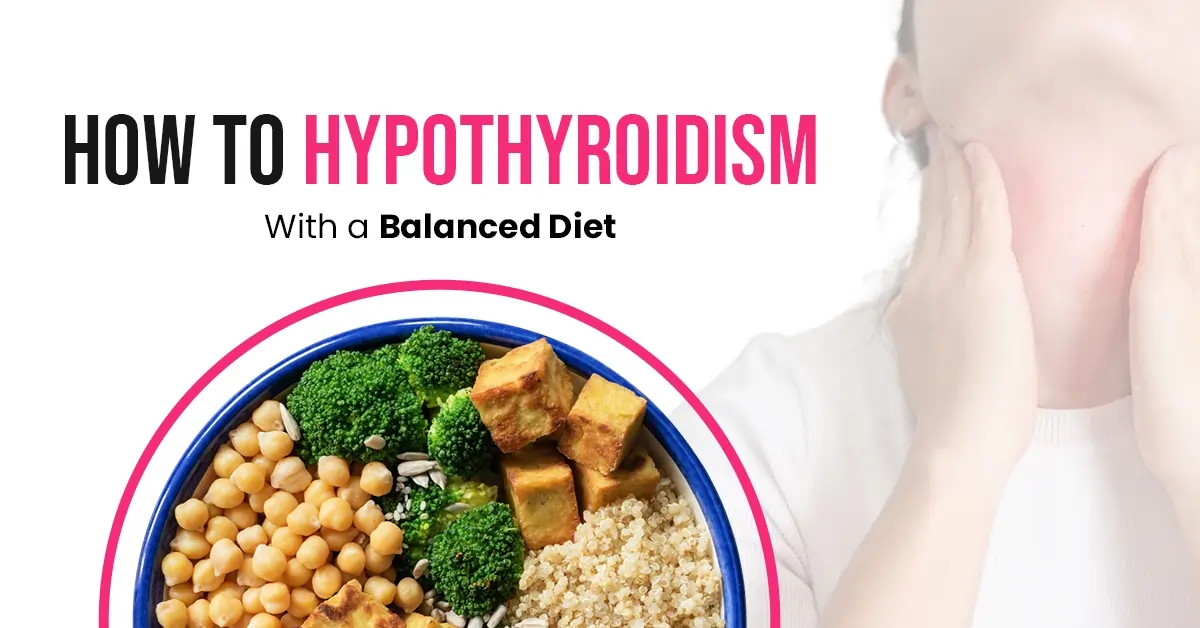Hypothyroidism is a condition where the thyroid gland fails to produce enough hormones, leading to a sluggish metabolism and various Health issues. While medication plays a crucial role in managing this condition, Diet can also significantly impact Thyroid Health.
A well-balanced Hypothyroidism Diet can help you manage symptoms and support overall well-being. We will explore the right foods, meal plans and lifestyle tips to help you better manage Hypothyroidism.
Understanding Hypothyroidism: Causes and Symptoms
Hypothyroidism occurs when the thyroid gland, located at the base of the neck, doesn’t produce enough thyroid hormones. This can result from autoimmune diseases like Hashimoto’s thyroiditis, iodine deficiency, thyroid surgery or certain medications.
Common symptoms include fatigue, weight gain, cold intolerance, dry skin, hair loss and depression. A proper Diet for hypothyroidism, along with medication, can help manage these symptoms effectively.
Nutritional Requirements for Hypothyroidism
Managing hypothyroidism involves focusing on nutrients that support thyroid function. Key nutrients include:
- Iodine: Key for thyroid hormone production. Sources include iodized salt, seafood, and dairy.
- Selenium: Helps in thyroid hormone metabolism, available in nuts and seeds.
- Zinc: Activates thyroid hormones, found in foods like dals, chana, and whole grains.
- Vitamin D and B12: Essential for energy and immunity, found in dairy, eggs, and fortified foods.
A balanced diet for hypothyroidism should include a variety of these nutrients to maintain optimal thyroid function and manage symptoms effectively.
Foods to Include in a Hypothyroidism Diet
- Moong Dal: Packed with Zinc and easy to digest, this dal supports thyroid function and provides essential nutrients.
- Methi Thepla: Rich in Iron and Fiber, methi helps in balancing hormones and improving metabolism.
- Spinach Saag: Full of Iron and Magnesium, spinach helps with energy and thyroid regulation.
- Amla: High in Vitamin C, it boosts immunity and overall thyroid health.
- Ragi: High in Calcium and Amino acids, ragi helps manage hypothyroidism by supporting bone Health.
- Jeera Water: Aids digestion and helps in weight management, making it perfect for those with a slow metabolism.
Foods to Avoid: What Not to Eat When You Have Hypothyroidism
Certain foods can interfere with thyroid hormone production and absorption. Here’s what to watch out for:
- Raw Cruciferous Vegetables: Limit raw cabbage, cauliflower, and broccoli as they contain goitrogens that can affect thyroid function. Cooking reduces their negative impact.
- Soy Products: Including soy milk and tofu can interfere with thyroid medication. Consume in moderation.
- Processed Foods: High in salt, sugar, and unhealthy fats, processed snacks can worsen weight gain and inflammation.
- Excess Caffeine: Overconsumption of tea or coffee can disrupt thyroid hormone absorption. Opt for herbal teas instead.
- Goitrogens: Found in cruciferous vegetables like broccoli, cauliflower, and cabbage, goitrogens can interfere with Thyroid hormone production. Cook these vegetables to reduce their goitrogenic effect.
Sample Hypothyroidism Diet Plan
Here’s a hypothyroidism meal plan to help manage symptoms effectively:
Breakfast: Ragi dosa with coconut chutney and a glass of warm jeera water.
Lunch: Bajra roti with palak paneer and a side of cucumber raita.
Snack: A handful of roasted makhanas or a small bowl of sprouted moong chaat.
Dinner: Methi paratha with dal tadka and sautéed green beans.
Dessert: A piece of jaggery for a sweet end to your meal, supporting digestion and energy.
This hypothyroidism meal plan includes nutrient-rich options that help in balancing thyroid function naturally.
The Role of Lifestyle in Managing Hypothyroidism
In addition to a Balanced Diet for Hypothyroidism, lifestyle changes are essential:
- Regular Exercise: Yoga, walking, or light strength training can help boost metabolism and energy.
- Stress Management: Practices like pranayama (deep breathing) and meditation can help reduce stress, which affects Thyroid Health.
- Adequate Sleep: Ensures proper hormone balance and supports weight management, crucial for hypothyroid patients.
- Consistent Medication Use: Take your thyroid medication as prescribed, ideally on an empty stomach, for best absorption.
Common Myths About Diet and Hypothyroidism
- Myth: All dairy should be avoided with hypothyroidism. Fact: Unless you have lactose intolerance or sensitivity, moderate dairy consumption can be part of a balanced Diet.
- Myth: Avoid all cruciferous vegetables. Fact: Cooking these vegetables reduces their goitrogenic effects, making them safe to eat in moderation.
- Myth: More iodine always helps. Fact: Excess iodine can harm thyroid function; it’s best to consume in recommended amounts.
Conclusion: Long-Term Benefits of a Structured Diet for Hypothyroidism
A balanced Hypothyroidism Diet enriched with desi ingredients, along with regular exercise and stress management, can greatly improve your thyroid function. Consistency in following a well-structured meal plan and a healthy lifestyle can help you manage hypothyroidism, enhance your energy levels, and support overall well-being.
Remember, your Diet is a vital part of managing hypothyroidism, fuel your body right, and you’ll see the positive changes over time.

